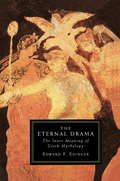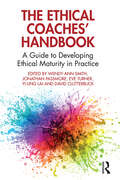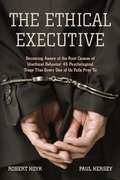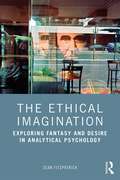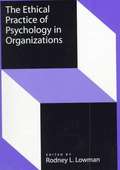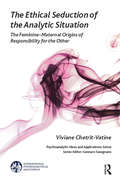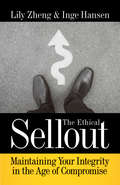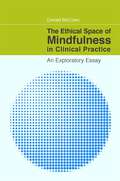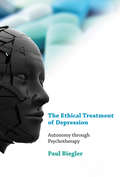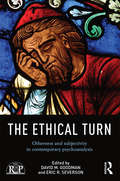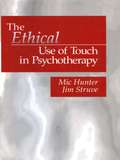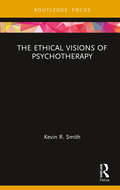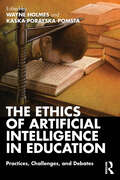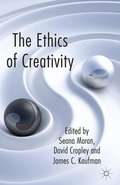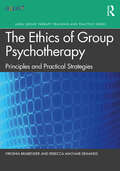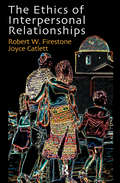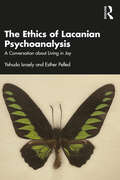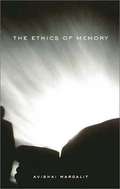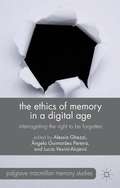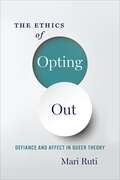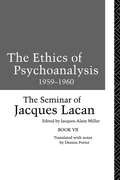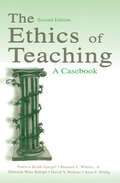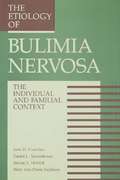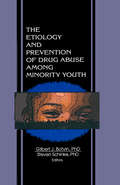- Table View
- List View
The Eternal Drama: The Inner Meaning of Greek Mythology
by Edward EdingerZeus, Aphrodite, Apollo, Artemis, Athena--do the gods and goddesses of Greece have anything to say to us that we haven't already heard? In this book, based on a series of his lectures, the eminent Jungian analyst and writer Edward F. Edinger revisits all the major figures, myths, oracles, and legends of the ancient Greek religion to discover what they can still reveal--representing, as they do, one of the religious and mythic foundations of Western culture. Building on C. G. Jung's assertion that mythology is an expression of the deepest layers of mind and soul, Dr. Edinger follows the mythic images into their persistent manifestations in literature and on into our modern lives. He finds that the gods indeed continue to speak as we grow in our capacity to listen and that the myths express the inner energies within all of us as much as ever. Heracles is eternally performing his labors, Perseus is still confronting Medusa, Theseus is forever stalking the Minotaur, and Persephone is still being carried off to life in a new realm.
The Ethical Coaches’ Handbook: A Guide to Developing Ethical Maturity in Practice
by Jonathan Passmore David Clutterbuck Eve Turner Wendy-Ann Smith Yi-Ling LaiWhat does it mean to be ethical as a coach? Just how ethical are you? How does ethics influence your coaching and how do you know if you are engaging in ethical practice? This important and eye-opening volume provides critical insight from the thought leaders in coaching across a full range of ethical issues. Presented in four parts, this new handbook works to guide the reader towards ethical maturity to strengthen their practice, though examination of theory and thought provoking practice examples. Part 1, Foundations of Ethics in Coaching, provides a detailed overview of the basic principles of ethical coaching. Part 2, Ethics in Coaching Practice, details specific examples of where you will need to think ethically and be guided by good ethics within your practice. Part 3, Pushing the Boundaries of Ethical Thinking in Coaching, dives deeper into topics such as race, managing mental health, the environment and marketing. Part 4 consists of twelve case studies which encourage you to think about putting the theory of the book into practice. The Ethical Coaches’ Handbook will provide ideal support to students, practitioners and coach educators looking to deepen, broaden and enhance their ethical coaching practice.
The Ethical Executive
by Robert Hoyk Paul HerseyIn the socially responsible, conscience-focused marketplaces of today, the demand for more ethical business processes and actions is increasing. Enron, Worldcom and - most recently - individual rogue financial traders have all helped to shake the public's faith in business. Studies have shown that 60% of people don't trust business leaders to tell the truth, yet many companies don't even have a code of ethics - and if they do there is no guarantee it will be followed. The Ethical Executive provides guidelines for anyone in business who wants to do the right thing. It looks at the root causes of unethical beviour and describes 44 psychological traps that the unwitting executive can fall prey to. Using case studies from international business such as Johnson & Johnson and Worldcom, it describes how corporate culture can encourage unethical behaviour through slavish obedience to authority, the sidestepping of responsibility, all-encompassing self interest, the blame culture and a self-serving bias. The Ethical Executive will help you to become aware of these traps - so you can be more cautious, vigilant and then hopefully avoid them.
The Ethical Imagination: Exploring Fantasy and Desire in Analytical Psychology
by Sean FitzpatrickWhat do we do with our fantasies? Are there right and wrong ways to imagine, feel, think, or desire? Do we have our fantasies, or do they have us? In The Ethical Imagination: Exploring Fantasy and Desire in Analytical Psychology, Sean Fitzpatrick explores how our obligation to the Other extends to our most intimate spaces. Informed by Jungian psychology and the philosophy of Emmanuel Levinas, Fitzpatrick imagines an ethical approach that can negotiate the delicate and porous boundary between inner and outer, personal and collective fantasy. Combining both theory and practice, the book examines theorists of the imagination, such as Plato, Coleridge, Sartre, and Richard Kearney, explores stories from contemporary culture, such as Jimmy Carter and New York’s "Cannibal Cop", and includes encounters in the consulting room. The Ethical Imagination explores how these questions have been asked in different ways across culture and history, and Fitzpatrick examines the impact of our modern, digital world on ethics and imagination. In this original examination of the ethical status of our imagination, this book illustrates how our greatest innovations, works of art, and acts of compassion emerge from the human imagination, but so also do our horrific atrocities. Fitzpatrick compellingly demonstrates that what and how we imagine matters. Unique and innovative, this book will be of immense interest to Jungian psychotherapists, analytical psychologists, and other mental health professionals interested in the ethics, the imagination, and clinical work with fantasy. It will also be an important book for academics and students of Jungian and post-Jungian studies, philosophy, religious studies, and ethics.
The Ethical Practice of Psychology in Organizations
by Rodney L. LowmanA collection of specific case studies on the ins and outs of effective human resources for your business or organization.
The Ethical Seduction of the Analytic Situation: The Feminine-Maternal Origins of Responsibility for the Other (The International Psychoanalytical Association Psychoanalytic Ideas and Applications Series)
by Viviane Chetrit-VatineAccording to Jacques Andre, "the patient's encounter with the analyst is a scene of seduction, the seductive statement being that of the fundamental rule or the invitation to address that which is most intimate or personal to a complete stranger." But the practice of psychoanalysis can only unfold if there is a strict respect for ethics. The words seduction and ethics, which at first sight seem mutually exclusive, are thus, as the author shows, at the heart of the analytic perspective. The author takes as her starting-point an encounter, which is not necessarily consensual, between Emmanuel Levinas' thought and his conception of philosophy as ethics - ethics understood as responsibility for the other - and that of the psychoanalyst Jean Laplanche, who posits the first adult other as a seducer of the young psyche from the outset, due to the transmission of enigmatic messages compromised by his or her unconscious. The analyst's ethical position is re-examined and with it the feminine/maternal origins of the human capacity for responsibility for the other.
The Ethical Sellout: Maintaining Your Integrity in the Age of Compromise
by Lily Zheng Inge HansenWe all fear selling out. Yet we all face situations that test our ideals and values with no clear right answer. In a world where compromise is an essential aspect of life, authors Lily Zheng and Inge Hansen make the bold claim that everyone sells out-and that the real challenge lies in doing so ethically.Zheng and Hansen share stories from a diversity of people who have found their own answers to this dilemma and offer new ways to think about marginalization, privilege, and self-interest. From these stories, they pull out teachable skills for taking the step from selling out to selling out ethically. The Ethical Sellout is for all those committed to maintaining their integrity in a messy world.
The Ethical Space of Mindfulness in Clinical Practice: An Exploratory Essay
by Donald Mccown Kenneth GergenMindfulness is a burgeoning field of study and practice within mental health care and medicine. Yet ethical codes, and the philosophy of the therapist-client relationship, differ greatly between disciplines, and even more between those disciplines and mindfulness-based approaches. The potential for ethical dilemmas is therefore significant. Donald McCown breaks new ground by taking a focused look at an ethics derived from contemporary clinical mindfulness practice itself. What does a secular ethics of mindfulness look like? Who is competent to work therapeutically with mindfulness, and how does one delimit areas and levels of competence? How do clinicians ethically understand the therapist-client relationship from the therapeutic position of mindfulness? And how do clinicians respond when the necessary restraints of their professional role and ethics code come into conflict with the mindfulness-based relationship and therapeutic position? This book makes a vital contribution to the understanding of ethics as the cornerstone of mindfulness-based practice, and will be of interest to all those involved in delivering mindfulness-based interventions, including psychologists, counselors, spiritual directors, occupational therapists, physicians, nurses, and educators.
The Ethical Treatment of Depression: Autonomy through Psychotherapy (Philosophical Psychopathology)
by Paul BieglerA philosopher argues there is an ethical imperative to provide psychotherapy to depressed patients because the insights gained from it promote autonomy.One in six people worldwide will experience depression over the course of a lifetime. Many who seek relief through the healthcare system are treated with antidepressant medication; in the United States, nearly 170 million prescriptions for antidepressants were written in 2005, resulting in more than $12 billion in sales. And yet despite the dominance of antidepressants in the marketplace and the consulting room, another treatment for depression has proven equally effective: psychotherapy—in particular, cognitive behavior therapy (CBT). Antidepressants can lift mood independent of a person's understanding of symptoms or stressors. By contrast, CBT teaches patients skills for dealing with distressing feelings, negative thoughts, and causal stressors. In The Ethical Treatment of Depression, Paul Biegler argues that the insights patients gain from the therapeutic process promote autonomy. He shows that depression is a disorder in which autonomy is routinely and extensively undermined and that physicians have a moral obligation to promote the autonomy of depressed patients. He concludes that medical practitioners have an ethical imperative to prescribe psychotherapy—CBT in particular—for depression. To make his case, Biegler draws on a wide philosophical literature relevant to autonomy and the emotions and makes a comprehensive survey of the latest research findings from the psychological sciences. Forcefully argued, densely researched, and engagingly written, the book issues a challenge to physicians who believe their duty of care to depressed patients is discharged by merely writing prescriptions for antidepressants.
The Ethical Turn: Otherness and Subjectivity in Contemporary Psychoanalysis (Relational Perspectives Book Series)
by Eric R. Severson David M. GoodmanLevinas (1969) claims that "morality is not a branch of philosophy, but first philosophy" and if he is right about this, might ethics also serve as a first psychology? This possibility is explored by the authors in this volume who seek to bring the "ethical turn" into the world of psychoanalysis. This phenomenologically rich and socially conscious ethics has taken centre stage in a variety of academic disciplines, inspired by the work of philosophers and theologians concerned with the moral fabric of subjectivity, human relationship, and socio-political life. At the heart of this movement is a reconsideration of the other person, and the dangers created when the question of the "Other" is subsumed by grander themes. The authors showcased here represent the exceptional work being done by both scholars and practitioners working at the crossroads between psychology and philosophy in order to rethink the foundations of their disciplines. The Ethical Turn: Otherness and subjectivity in contemporary psychoanalysis guides readers into the heart of this fresh and exciting movement and includes contributions from many leading thinkers, who provide fascinating new avenues for enriching our responses to suffering and understandings of human identity. It will be of use to psychoanalysts, professionals in psychology, postgraduate students, professors and other academics in the field.
The Ethical Use of Touch in Psychotherapy
by Jim Struve Michael G. HunterIs the bias against touch in psychotherapy justified? Is ethical touch an oxymoron? Can the recovery process be complete without healing touch? Mental health professionals are entrusted with the awesome responsibility of providing appropriate treatment for clients in a safe environment that nurtures trust, a necessary ingredient for optimum movement through the therapeutic process. Though treatment approaches vary, most modalities are verbally based and, in theory, exclude physical contact. Fearing that any form of touch would likely lead to sexual feelings or interaction, clinicians tend to shy away from the topic. In this book, however, Mic Hunter and Jim Struve skilfully demonstrate that touch - a most basic human need - is intrinsic to
The Ethical Visions of Psychotherapy
by Kevin R SmithThe standard view of psychotherapy as a treatment for mental disorders can obscure how therapy functions as a social practice that promotes conceptions of human well-being. Building on the philosophy of Charles Taylor, Smith examines the link between therapy and ethics, and the roots of therapeutic aims in modern Western ideas about living well. This is one of two complementary volumes (the other being Therapeutic Ethics in Context and in Dialogue). This volume explores the links between therapeutic aims and conceptions of well-being. It examines several cognitive-behavioral and psychoanalytic therapies to illustrate how they can be distinguished by their divergent ethics. Smith argues that because research utilizing standard measures of efficacy shows little difference between the therapies, the assessment of their relative merits must include evaluation of their distinct ethical visions. A key text for upper level undergraduates, postgraduate students, and professionals in the fields of psychotherapy, psychoanalysis, theoretical psychology, and philosophy of mind.
The Ethics of Artificial Intelligence in Education: Practices, Challenges, and Debates
by Wayne HolmesThe Ethics of Artificial Intelligence in Education identifies and confronts key ethical issues generated over years of AI research, development, and deployment in learning contexts. Adaptive, automated, and data-driven education systems are increasingly being implemented in universities, schools, and corporate training worldwide, but the ethical consequences of engaging with these technologies remain unexplored. Featuring expert perspectives from inside and outside the AIED scholarly community, this book provides AI researchers, learning scientists, educational technologists, and others with questions, frameworks, guidelines, policies, and regulations to ensure the positive impact of artificial intelligence in learning.
The Ethics of Consciousness (Elements in Bioethics and Neuroethics)
by Walter GlannonThis Element examines the main ethical aspects of consciousness It argues that consciousness is not intrinsically valuable but has value or disvalue for individuals depending on its phenomenology (what it is like to be aware) and content (what one is aware of). These two components of awareness shape normative judgments about how ordered, disordered, altered, restored, diminished and suppressed conscious states can benefit or harm individuals. They also influence moral judgments about whether intentionally causing these states is permissible or impermissible and how these states can affect behavior. After describing its neurobiological basis, this Element discusses ethical and legal issues in six categories of consciousness: phenomenal and access consciousness; intraoperative awareness; prolonged disorders of consciousness, dissociative disorders, the role of consciousness in determining death; and altering and suppressing awareness near the end of life.
The Ethics of Creativity
by James C. Kaufman Seana Moran David CropleyThe Ethics of Creativity illuminates the thorny issues that arise when novel creative ideas collide with what we believe to be 'right' or 'good'. This book tackles questions of when creativity and ethics tend to coincide and when conflict, and how both might be harnessed to support a brighter future for all.
The Ethics of Group Psychotherapy: Principles and Practical Strategies (AGPA Group Therapy Training and Practice Series)
by Virginia Brabender Rebecca MacNair-SemandsThe Ethics of Group Psychotherapy provides group psychotherapists with the ethical and legal foundation needed to engage in effective decision-making in their everyday group practices. This text provides readers with a framework for understanding ethical dilemmas through a review of major models of ethical thinking, including principlism, feminism and the ethics of care, and virtue ethics. The authors use this foundation to explore those problems emerging most routinely in group practice, among which are safeguarding members’ personal information, protecting members’ autonomy, and helping members to process differences—particularly those related to privilege and oppression—in a way that furthers interpersonal relations and social justice. Throughout the text, practical tools such as using assessments to aid in member selection and tracking progress and outcome through measurement-based care are offered that bolster the group psychotherapist’s effectiveness in ethical decision-making. Featuring questions for discussion and items to assess the reader’s master of the material, this text will be a valuable tool in classroom and small-group learning.
The Ethics of Interpersonal Relationships
by Robert W. Firestone Joyce CatlettWriting this book springs from a deep feeling for people and a grave concern that without a proper understanding of the reasons for their inhumanity in relation to one another and the development of a compassionate world view, it is likely that human beings may eventually destroy themselves and life on the planet. This work is an attempt to explain the source of destructive behaviour and how it manifests itself in personal relationships between men, women, couples, and families, and in the social arena. The author presents a position that offers a hope of altering the destiny of humankind's unethical behavior through better psychological understanding and education. Understanding the source of a person's aggressiveness in defending the fantasy bond and learning to cope with the voice process have strong implications for child-rearing and better mental health practices.
The Ethics of Lacanian Psychoanalysis: A Conversation about Living in Joy
by Yehuda Israely Esther PelledThe Ethics of Lacanian Psychoanalysis observes different aspects of life – childhood, romantic love, sex, death, and human suffering – through a Lacanian lens, with a glance toward a Buddhist point of view. Combining Lacanian psychoanalysis with insight from Freud, Bion, and the Zen masters, this book suggests finding ways to suffer less and cultivate a passion for life. Yehuda Israely and Esther Pelled consider the ethics in the light of which people live, and the questions pertinent to this choice. What kind of person do you want to be? What desire will you choose your life to be led by? How will you deal with separations, relationships, and cravings that you cannot control? This book raises these questions and proposes possible answers through an accessible, conversational format. The Ethics of Lacanian Psychoanalysis will be of interest to psychoanalysts in practice and in training as well as readers looking to learn more about applying Lacanian ideas to everyday life.
The Ethics of Memory
by Avishai MargalitMuch of the intense current interest in collective memory concerns the politics of memory. In a book that asks, "Is there an ethics of memory?" Avishai Margalit addresses a separate, perhaps more pressing, set of concerns. <p><p> The idea he pursues is that the past, connecting people to each other, makes possible the kinds of "thick" relations we can call truly ethical. Thick relations, he argues, are those that we have with family and friends, lovers and neighbors, our tribe and our nation--and they are all dependent on shared memories. But we also have "thin" relations with total strangers, people with whom we have nothing in common except our common humanity. A central idea of the ethics of memory is that when radical evil attacks our shared humanity, we ought as human beings to remember the victims.<p> Margalit's work offers a philosophy for our time, when, in the wake of overwhelming atrocities, memory can seem more crippling than liberating, a force more for revenge than for reconciliation. Morally powerful, deeply learned, and elegantly written, The Ethics of Memory draws on the resources of millennia of Western philosophy and religion to provide us with healing ideas that will engage all of us who care about the nature of our relations to others.
The Ethics of Memory in a Digital Age
by Alessia Ghezzi Ângela Guimarães Pereira Lucia Vesnić-AlujevićThis edited volume documents the current reflections on the 'Right to be Forgotten' and the interplay between the value of memory and citizen rights about memory. It provides a comprehensive analysis of problems associated with persistence of memory, the definition of identities (legal and social) and the issues arising for data management.
The Ethics of Opting Out: Queer Theory's Defiant Subjects
by Mari RutiIn The Ethics of Opting Out, Mari Ruti provides an accessible yet theoretically rigorous account of the ideological divisions that have animated queer theory during the last decade, paying particular attention to the field's rejection of dominant neoliberal narratives of success, cheerfulness, and self-actualization. More specifically, she focuses on queer negativity in the work of Lee Edelman, Jack Halberstam, and Lynne Huffer, and on the rhetoric of bad feelings found in the work of Sara Ahmed, Lauren Berlant, David Eng, Heather Love, and José Muñoz. Ruti highlights the ways in which queer theory's desire to opt out of normative society rewrites ethical theory and practice in genuinely innovative ways at the same time as she resists turning antinormativity into a new norm. This wide-ranging and thoughtful book maps the parameters of contemporary queer theory in order to rethink the foundational assumptions of the field.
The Ethics of Psychoanalysis 1959-1960: The Seminar of Jacques Lacan
by Jacques LacanIn his famous seminar on ethics, Jacques Lacan uses this question as his departure point for a re-examination of Freud's work and the experience of psychoanalysis in relation to ethics. Delving into the psychoanalyst's inevitable involvement with ethical questions, Lacan clarifies many of his key concepts. During the seminar he discusses the problem of sublimation, the paradox of jouissance, the essence of tragedy, and the tragic dimension of analytical experience. One of the most influential French intellectuals of this century, Lacan is seen here at the height of his powers.
The Ethics of Teaching: A Casebook
by Patricia Keith-Spiegel David V. Perkins Bernard E. Whitley, Jr. Deborah Ware Balogh Arno F. WittigThe Ethics of Teaching provides a frank discussion of the most frequently encountered ethical dilemmas that can arise in educational settings, as well as tips on how to avoid these predicaments and how to deal with them when they do occur. The goal is to stimulate discussion and raise faculties' consciousness about ethical issues. Ethical dilemmas are presented as short, engaging case scenarios, most of which are based on actual situations, so as to furnish more realistic and interesting stimuli for individual reflection and group discussion. These scenarios offer the opportunity to consider the subtle complexities inherent in the social and psychological contexts in which educator-student interactions occur and the effects of those complexities on ethical decision making. Each case is followed by a detailed analysis and advice. The book's 195 cases are grouped into 22 chapters representing topics, such as the controversial classroom presentations and assignments, debatable testing and grading practices, problematic student-faculty interactions, dual-role relationships with students, collegial conflicts, managing very difficult students, and confidentiality dilemmas. The Ethics of Teaching: A Casebook, Second Edition: *focuses on commonly encountered ethical "gray areas" that have no clear solution; *includes questions to stimulate discussion of related ethical issues; *concludes with a chapter on prevention, peer mentoring, and intervention; and *serves as excellent "assigned reading" to stimulate group discussion in teaching workshops and faculty development programs. The first edition of this book evolved by collecting a variety of teaching situations that commonly occur in college and university settings. The authors then created responses to the situations and circulated both the cases and the responses to reviewers from a number of departments across the country. As a result, the vast majority of the cases are "discipline free." The second edition features many new cases to reflect recent trends and events related to academic ethics. Questions were added to stimulate discussion and to further elaborate the issues. The Ethics of Teaching: A Casebook is ideal for college and university faculty, graduate assistants, and administrators involved in workshops, graduate teaching assistant courses, and faculty development and new faculty orientation programs. As a result of the book's cross-disciplinary development, it will be beneficial to faculty from a broad spectrum of disciplines.
The Etiology Of Bulimia Nervosa: The Individual And Familial Context: Material Arising From The Second Annual Kent Psychology Forum, Kent, October 1990 (Series In Applied Psychology Ser.)
by Janis H. Crowther Daniel L. Tennenbaum Stevan E. Hobfoll Mary Ann Parris StephensFirst published in 1992. Routledge is an imprint of Taylor & Francis, an informa company.
The Etiology and Prevention of Drug Abuse Among Minority Youth
by Steven Schinke Gilbert J BotvinSince 1992, marijuana use among 8th graders has tripled, among 10th graders it has nearly doubled, and its use among high school seniors has increased by 50 percent. The use of other illicit drugs is also heavily on the rise. Yet, there exists very little research and literature on the etiology and prevention of drug abuse among those most at risk--disadvantaged, inner-city, minority youth. The Etiology and Prevention of Drug Abuse Among Minority Youth is an important first step in remedying this gap in the literature and for getting at the heart of the psychosocial factors that promote and sustain drug use among minority youth.The book’s chapters evolved from a program of research funded by the National Institute on Drug Abuse and Cornell University Medical College’s Institute for Prevention Research concerning drug abuse prevention with multi-ethnic youth. So that you might learn effective strategies for intervening with at-risk adolescents and teenagers, The Etiology and Prevention of Drug Abuse Among Minority Youth discusses: correlates and predictors of alcohol and drug use community-based skills interventions how youths offset feelings of distress or self-derogation by bonding with deviant peers the advantages of community-oriented outreach programs the role of cultural factors as they shape vulnerability to adolescent alcohol and drug use the role of ethnic identity as a moderator of psychosocial risk for alcohol and marijuana use the needs of youth at high risk for future use preventing gateway drug use drug use among youth living in homeless shelters the conditions of public housing and how they affect the etiology of drug abuseAn essential tool for policymakers, social workers, clinicians, researchers, psychiatrists, and other professionals in chemical dependency and narcotics rehabilitation, The Etiology and Prevention of Drug Abuse Among Minority Youth provides you with vital insight on the causes of drug use among minority adolescents, the strengths and limitations of different intervention approaches, and incentive to find appropriate ways for working with at-risk, minority teenagers.
